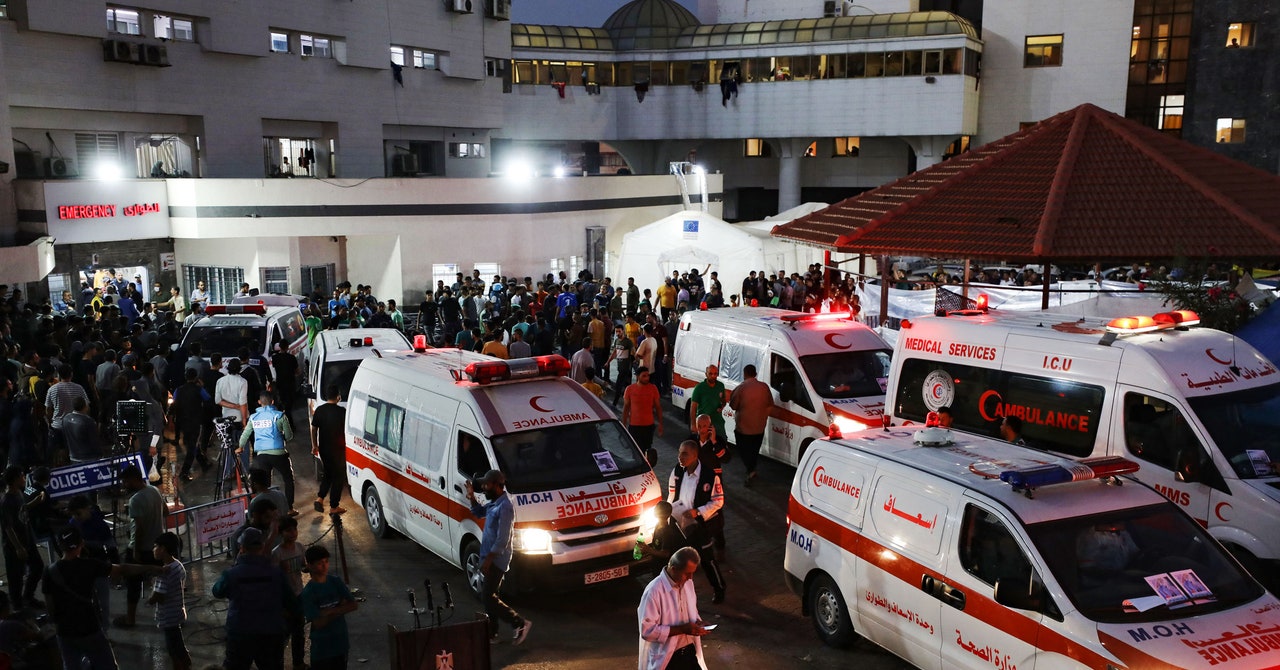
Even before this week’s deadly hospital blast, Gaza’s health system was already on the brink of collapse. At least 3,700 Palestinians in Gaza have been declared dead since the beginning of the Israeli-Hamas war, and an estimated 12,000 have been injured, according to the Gaza Health Ministry. Gaza’s health system has faced a huge influx of emergency patients, while at the same time suffering the effects of bombardment and having utilities cut.
On October 13, the Israeli military told everyone in the north of Gaza to evacuate. This created an impossible situation for hospitals filled with patients who were too unwell to be moved. The World Health Organization said the evacuation order was a “death sentence” for the sick and injured.
“The whole health system is collapsing around us,” says Ghassan Abu-Sittah, a plastic surgeon with Médecins Sans Frontières (MSF) who is working in Gaza at Al-Shifa Hospital, the biggest medical facility in the Gaza Strip, located in Gaza City. He paints a picture of a system stripped down to the bare bones.
The orthopedic department has run out of the pins and rods needed to stabilize fractures, Abu-Sittah says. The water pressure has become too weak to run the sterilization machines that disinfect equipment, meaning the hospital staff are forced to rely on a chemical antiseptic that hasn’t been commonly used for decades. There are no ventilators available. There is not even enough room for the injured in the hospital. “There is no more space or mattresses to put the wounded on in the corridors,” says Abu-Sittah. Health care staff are exhausted and are struggling to deal with the overwhelming number of injured.
On October 18, Abu-Sittah helped treat a patient with a wound that had become infected and septic. But with all operating rooms full, doctors could not treat it in time, and the patient will lose a leg as a result.
Since Israel blocked access to electricity in Gaza more than a week ago, hospitals have been relying on backup generators. Now they’re running dangerously low on fuel. The United Nations Office of the Coordination of Humanitarian Affairs reported on Wednesday that Gaza’s Ministry of Health is redistributing fuel from other public facilities to keep hospital generators running. “They’re running out of everything,” says Zaher Sahloul, the president of MedGlobal, an NGO that is supporting medical facilities in Gaza. The International Committee of the Red Cross (ICRC) has said that without electricity, “hospitals risk turning into morgues.”
Surgeons at Al-Shifa Hospital are operating without painkillers, according to Christos Christou, the international president of MSF. MSF team members say that they have “heard wounded patients screaming in pain.”
Al-Shifa is currently working at more than 600 percent over capacity, its director-general Muhammad Abu Salmiya said in an editorial published in The Lancet on October 18. The same day, Abu Salmiya told the Associated Press that the “hospital’s generators would run out within hours.”
Chris Hanger, a spokesperson for the ICRC, told WIRED that surgeons at Al-Shifa Hospital are working 24 hours a day to care for the wounded. “They have told us that the whole system is on its knees as they try and triage patients, but there is no way to manage the number of casualties,” he says. “All surgical theaters are occupied.”
Northern Gaza’s Kamal Adwan Hospital is receiving “mostly burnt-out bodies, bodies full of shrapnel, mutilated bodies of women and children,” says Sahloul, who is in regular contact with Hussam Abu Safiya, MedGlobal’s lead doctor in northern Gaza. Almost all of their victims are women and children, Sahloul says.
Another concern is that the sheer number of dead bodies may lead to a disease outbreak. “The hospital is overflowing with dead bodies,” Sahloul says. Abu Safiya, the doctor working in northern Gaza, is worried that decomposing bodies will contaminate water and cause a disease outbreak.
On October 18, all five of Gaza’s wastewater treatment plants had been forced to shut down due to a lack of power, according to the UN Office of the Coordination of Humanitarian Affairs, increasing the risk of waterborne diseases. Al-Shifa Hospital is burying bodies in mass graves.
With limited resources, caring for the most severely injured people has been prioritized. That means patients requiring continuous treatment for cancer and other diseases can no longer be cared for. The Turkish-Palestinian Friendship Hospital, located to the south of Gaza City, is on the brink of shutting down, meaning all 9,000 cancer patients in the Gaza Strip will be left without care. “Many of these people will die,” says Sahloul. “Not from the bombing, but from the lack of access to critical medications.”
Following US president Joe Biden’s talks with Israeli prime minister Benjamin Netanyahu, it was announced on October 19 that 20 trucks with humanitarian relief deliveries will be allowed to cross the Egypt-Gaza border, carrying food, water, and medical supplies. The aid will start moving Friday at the earliest, according to the White House.
In the meantime, Gaza’s health system will continue to crumble and casualties will continue to rise. Hospitals are so stretched that doctors aren’t able to prevent patients’ from dying, Abu-Sittah says. “You are just an emergency department where people come, and if they are going to survive, they survive, and if they are not, they are dead.”
